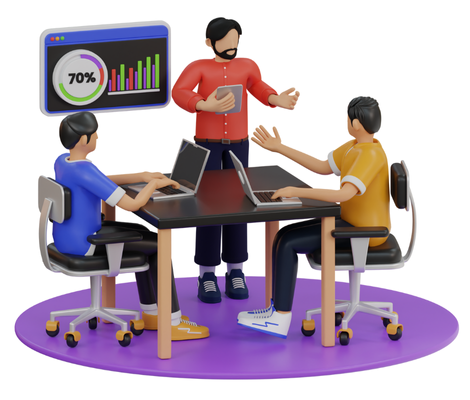Let’s break down the differences, benefits, and considerations to help you decide which is right for your business.
What Is ERP?
Enterprise Resource Planning (ERP) is an integrated suite of applications designed to manage core business processes—finance, HR, supply chain, inventory, CRM, and more—in a centralized system.
Popular ERP systems in 2025 include SAP S/4HANA, Oracle NetSuite, Odoo, and Microsoft Dynamics 365.
Key traits of ERP software:
-
Out-of-the-box modules covering most standard business functions.
-
Centralized data management with strong reporting and analytics.
-
Predefined workflows and best practices.
-
Regular vendor-driven updates and support.
What Is Custom Software?
Custom software is built specifically for your organization’s workflows, processes, and business model. Instead of fitting into predefined ERP modules, it’s designed around your requirements.
Key traits of custom software:
-
Fully tailored to business-specific processes.
-
Flexible and scalable as the company grows.
-
Integrates seamlessly with existing tools or third-party APIs.
-
Can provide a competitive advantage by enabling unique features competitors don’t have.
ERP vs. Custom Software: A 2025 Comparison
| Feature | ERP | Custom Software |
|---|
| Implementation Speed | Faster (ready-to-use modules) | Slower (requires development) |
| Cost (Initial) | Moderate to High (license + setup) | High (development costs) |
| Cost (Long-term) | Ongoing subscription/maintenance fees | One-time build, lower long-term if managed well |
| Flexibility | Limited to vendor’s structure | Fully flexible, designed for you |
| Scalability | Scales with vendor upgrades | Scales with additional development |
| Updates & Support | Vendor-driven updates, regular patches | Depends on your dev team/vendor |
| Industry Fit | Generic, industry-specific ERPs available | Exact fit for niche requirements |
| Competitive Advantage | Standardized features competitors may also use | Unique workflows can give an edge |
| Time to Value | Quick ROI if workflows align with ERP | ROI depends on development and adoption speed |
ERP in 2025: The Modern Advantage
ERP solutions in 2025 are much more cloud-native, AI-powered, and modular compared to traditional systems.
-
AI-powered analytics for demand forecasting, fraud detection, and HR predictions.
-
Low-code/no-code customization options, reducing the rigidity of past ERP systems.
-
Subscription models making ERP more accessible to small and mid-sized businesses.
This means ERP is no longer “one-size-fits-all”—modern vendors allow some degree of personalization while keeping costs predictable.
Custom Software in 2025: Why Businesses Choose It
On the other hand, custom software development has become faster and cheaper thanks to:
-
Low-code frameworks speeding up development.
-
Cloud-native architectures making deployment easier.
-
Generative AI-assisted coding reducing development cycles.
Businesses choose custom software in 2025 when:
-
They operate in niche industries with very specific workflows.
-
They want a competitive advantage through unique features.
-
They’re scaling rapidly and need software that adapts to their business—not the other way around.
Which Is Right for Your Business in 2025?
The choice between ERP and custom software depends on your priorities:
✅ Choose ERP if:
-
Your workflows align with standard business processes.
-
You want faster implementation and vendor-backed support.
-
You prefer predictable subscription pricing.
✅ Choose Custom Software if:
-
Your business model is unique and not well served by standard ERPs.
-
You want full control over features, integrations, and scalability.
-
You see software as a strategic advantage, not just a tool.
Conclusion
In 2025, both ERP and custom software have evolved significantly. ERP systems are smarter, more modular, and more affordable, while custom software is faster to build and highly adaptable.
The right choice depends on whether your business needs standardization and speed (ERP) or flexibility and uniqueness (custom software). Many companies even take a hybrid approach—implementing ERP for core functions while developing custom solutions for specialized needs.
Ultimately, the decision should align with your budget, growth plans, and competitive strategy.






